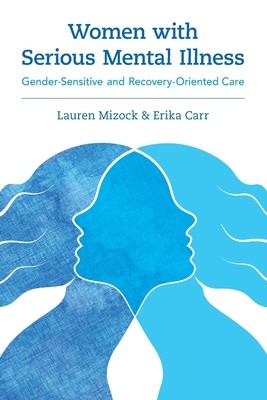
- We will send in 10–14 business days.
- Author: Lauren Mizock
- Publisher: Oxford University Press, USA
- ISBN-10: 0190922354
- ISBN-13: 9780190922351
- Format: 15.5 x 23.1 x 1.5 cm, softcover
- Language: English
- SAVE -10% with code: EXTRA
Reviews
Description
Women with serious mental illness (SMI) include those with schizophrenia, severe depression, bipolar disorder, and/or complex posttraumatic stress disorder whose illnesses significantly impair daily functioning. While these women commonly present in psychotherapy and research samples, their needs are rarely addressed in academic literature and mental health training programs.
Women with Serious Mental Illness focuses on these women's experiences, including the history of mistreatment, marginalization, and oppression they have encountered within their everyday lives and within the mental health system. With decades of combined clinical experience, Drs. Lauren Mizock and Erika Carr offer evidence-based strategies for mental health professionals working with this overlooked population. Built on a framework of feminist theory, concepts on the intersectionality of oppression, and a more holistic view of recovery, the book examines the impact of racism, sexual objectification, trauma, relationships, work, and class on the development and presentation of symptoms of mental illness in these women. These discussions are then synthesized into an effective treatment intervention, Gender-Sensitive and Recovery-Oriented Care (G-ROC), which values an equal therapeutic relationship and validates the client as an expert on their own mental health. Chapters includeworksheets, discussion questions, and case narratives for easy practical application in research or training programs. Women with Serious Mental Illness underscores the need for improved care for women, men, and gender nonbinary people with serious mental illness. Using these tools, clients can begin the process of seeking hope, empowerment, and self-determination beyond the effects of mental illness.
EXTRA 10 % discount with code: EXTRA
The promotion ends in 18d.01:33:06
The discount code is valid when purchasing from 10 €. Discounts do not stack.
- Author: Lauren Mizock
- Publisher: Oxford University Press, USA
- ISBN-10: 0190922354
- ISBN-13: 9780190922351
- Format: 15.5 x 23.1 x 1.5 cm, softcover
- Language: English English
Women with serious mental illness (SMI) include those with schizophrenia, severe depression, bipolar disorder, and/or complex posttraumatic stress disorder whose illnesses significantly impair daily functioning. While these women commonly present in psychotherapy and research samples, their needs are rarely addressed in academic literature and mental health training programs.
Women with Serious Mental Illness focuses on these women's experiences, including the history of mistreatment, marginalization, and oppression they have encountered within their everyday lives and within the mental health system. With decades of combined clinical experience, Drs. Lauren Mizock and Erika Carr offer evidence-based strategies for mental health professionals working with this overlooked population. Built on a framework of feminist theory, concepts on the intersectionality of oppression, and a more holistic view of recovery, the book examines the impact of racism, sexual objectification, trauma, relationships, work, and class on the development and presentation of symptoms of mental illness in these women. These discussions are then synthesized into an effective treatment intervention, Gender-Sensitive and Recovery-Oriented Care (G-ROC), which values an equal therapeutic relationship and validates the client as an expert on their own mental health. Chapters includeworksheets, discussion questions, and case narratives for easy practical application in research or training programs. Women with Serious Mental Illness underscores the need for improved care for women, men, and gender nonbinary people with serious mental illness. Using these tools, clients can begin the process of seeking hope, empowerment, and self-determination beyond the effects of mental illness.


Reviews